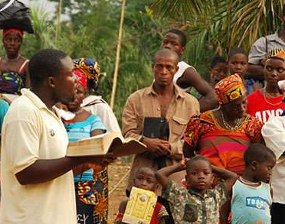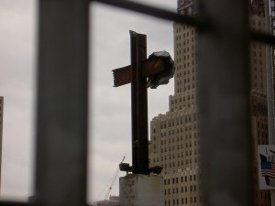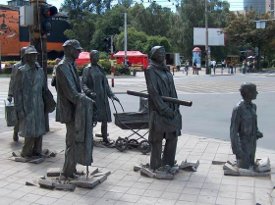Book Review - Growing Up Yanomamö
[amazon 1602650098 thumbnail]
Over the years it has been my lot to read many biographies and autobiographies of missionaries. A career in missions makes it almost obligatory. In too many instances I have found these accounts to be either dull or, shall we say…depressing. One can only take so much “look what I gave up for Christ” before moving on to something a little more bright and cheery—like an anthology of the works of Edgar Alan Poe. Is it any wonder more young people don’t go into missions?
On the other hand, one of my favorite pastimes is to sit in on a group of older missionaries and listen to them tell stories. Inevitably their eyes light up and they lean forward in their seats, waving their hands excitedly as they recount their many adventures. Often they recall the tragedies and disappointments, yet there is an enthusiasm and joyful sense of purpose—even as tears fill their eyes.
When I opened Growing Up Yanomamö (2009, Grace Acres Press) I encountered a refreshingly different kind of missionary biography. It was as if author Mike Dawson—“missionary kid” and veteran missionary in the Amazon rainforest of Venezuela—was sitting across the table from me, regaling me with story after amazing story from his past. His style is engaging and conversational, and his stories are spell-binding.
Born in Venezuela in 1955 to missionary parents, Mike Dawson grew up with the Yanomamö people. (His command of the language was such that he was once able to convince the somewhat-hostile men of a village he was visiting that he was himself a Yanomamö whose mother had kept him out of the sun.) After graduating from high school he continued to work among the Yanomamö for two years. He then attended Bible college in the United States, returning with his new bride to Venezuela and the Yanomamö shortly after graduating.
The majority of Growing Up Yanomamö could be described as a vigorous romp through jungle. One reads of hunting for tapirs and spider-monkeys, of encounters with alligators and giant anacondas, and of spiritual showdowns with tribal witch-doctors. (This last fascinated me to no end. When I was “growing up Gothard,” it was accepted doctrine that demons were attracted to music with the “worldly back-beat.” Yet, according to Dawson, the demons have a terrible aversion to Southern Gospel and Michael Card. Perhaps it wasn’t the drums after all…) Yet through all of this adrenaline-pumping high adventure run the themes of divine protection, the triumph of the gospel, and the sovereign purpose of God in the midst of tragedy.
Dawson’s style is conversational. There are interruptions, rabbit trails, and third-person accounts. Rather than distracting, these add to the authenticity of the narrative and make it hard to put down. And not everything is “happy-go-lucky.” I challenge anyone who has a soul to read chapter twenty-four—in which Dawson records the home-going of Reneé, his wife of twelve years—without a tearing up. Even in the telling of this, his greatest personal tragedy, Dawson avoids the major pitfalls of missionary literature: he speaks with authenticity without descending into self-pity.
Discussion
A Model for Medical and Dental Missions
 Introduction
Introduction
This article presents a practical model or method for dental and medical evangelism in foreign countries used most effectively to help establish and grow local churches. Of course, it is ultimately God who works in people’s lives to draw them to saving faith in Jesus Christ (John 6:44). No evangelistic formula or technique will save anyone. But God expects us to be wise, prepared, faithful servants when we take the gospel to another country.
The model for effectively using field teams of health professionals discussed below is a proven way to help fulfill our part of the Great Commission as we look to God to work a miracle in people’s hearts to draw them to salvation. Ideally, a missionary or national local church hosting a field team should be involved in all parts of the model. Where it cannot, the field team can fill in some of the gaps. But the best path to success is when national pastors and local church believers actively participate in each step of the process.
Discussion
God Came to "Kopano"

Kopano Baptist Church near Pretoria, South Africa, is about as unassuming an assembly as you will find anywhere on planet earth. Actually, you won’t find it at all unless an informed local leads you there. This fledgling church is tucked away off a rural road in a dusty village where neither fame nor fortune has ever dared show face. But God has.
According to church-growth gurus, Kopano Baptist Church is doing absolutely everything wrong. But unfazed by the dictates of such experts, God is working wonders in this obscure village through this humble church. Theirs is a story that will never be recorded on the glossy pages of prestigious journals or heralded in documentaries touting the latest ecclesiastical success story. Yet theirs is a story worthy of broadcast.
The village Kopano serves has no running water or sewer, no asphalt or gravel roads, no cars, sidewalks, street lamps or grass. Here the only things in noticeable abundance are stray dogs, brazen rats, cheap booze and abject poverty.
Kopano Baptist Church meets in an abandoned produce barn: no windows or interior walls, no carpet or restrooms, no banners, crosses, pictures, or decorative touches of any sort save the small hand-painted sign attached to the front wall that reads simply: “Kopano Baptist Church.” A few plastic chairs supplement the wooden crates that serve as pews. A string of four naked bulbs hangs over the center aisle—the electricity supplied via an extension cord plugged into the outlet of a nearby flat. Several candles waxed to the cement floor encircle the assembly to serve during the inevitable power outage. Parishioners share space with the rats—an improvement on an earlier day when rats shared space with the parishioners.
Discussion
The Expansion of Christianity and the Expansion of Islam: Understanding the Differences
 Nineteenth-century Christian missions exploded across the globe with the general expectation that the gospel would penetrate the whole world, and that the evangelism of the world would conceivably be completed within a century or so. That sense of optimism is not so prevalent today, probably in part because of the decline of Christianity in parts of the world that were at one time the fountainhead of Christian faith.
Nineteenth-century Christian missions exploded across the globe with the general expectation that the gospel would penetrate the whole world, and that the evangelism of the world would conceivably be completed within a century or so. That sense of optimism is not so prevalent today, probably in part because of the decline of Christianity in parts of the world that were at one time the fountainhead of Christian faith.
Discussion
Walking Together
 Reprinted with permission from Frontline Missions International. All rights reserved.
Reprinted with permission from Frontline Missions International. All rights reserved.
There is a spot near the Temple of Heaven in Beijing, a little marble circle that marks what the ancient Chinese believed to be the very center of the universe. Today this cosmic bulls-eye is just a place for grinning tourists to stand and have their picture taken. However, many ancient peoples had similar beliefs about their realm being at the center of things. Why else, for example, would one say, “All roads lead to Rome”? While it is an interesting idea that the center of the universe is located in Beijing or Rome, I am not convinced. In fact, I think the chair I am sitting in writing this article may just as likely be the true center of the universe! Seriously though, when it comes to missions, I am afraid that for too long, many of us here in America have behaved as if we were at the center of the universe.
In olden days, designating a particular place as the center of the universe was easy because to many ancients, their world was flat and relatively small. After a whole “new world” was discovered, though, little maps grew into great globes, and centers were more difficult to designate. Similarly, in the missions realm, the world is very different from the one that William Carey, Adoniram Judson, and Hudson Taylor lived in.
These men and other missionary trailblazers inspired their generation to answer the Great Call. In the 19th and 20th centuries, missionary ranks were filled mostly by those from the English-speaking world: British, American, and Canadian. As they crossed continents and cultures with the Gospel, though, things changed. People of every nation, tongue, and tribe were saved through faith in Christ. Churches sprang up, and Christians in many lands began sharing the Gospel with their own countrymen.
Discussion
Poland: Always the Underdog
 Maybe three years in Poland has left me somewhat nostalgic, but I love America; I miss America. As Ginger and I learn the language and observe this culture so foreign to our own, we often find ourselves comparing the two. One culture is home, and the other, well … it’s growing on us. Many similarities can be observed but a few stark differences exist.
Maybe three years in Poland has left me somewhat nostalgic, but I love America; I miss America. As Ginger and I learn the language and observe this culture so foreign to our own, we often find ourselves comparing the two. One culture is home, and the other, well … it’s growing on us. Many similarities can be observed but a few stark differences exist.
Discussion
A Pink Slip for an Apostle
 From: Rev. Alexander Demas
From: Rev. Alexander Demas
New Ekklesia Church, Thessalonica
To: Missionary Saul Paulus (The Apostle Paul)
C/c: Church at Antioch
Dear Brother Paul,

Discussion